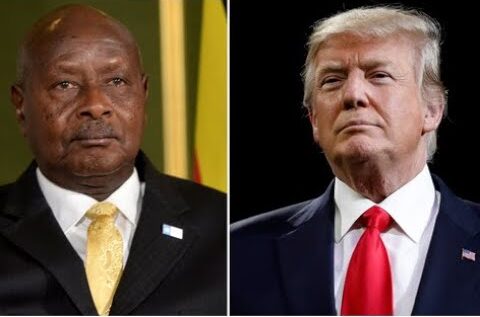Uganda now finds itself on a list of 36 countries facing potential U.S. visa restrictions under a proposed expansion of immigration controls by President Donald Trump.
While the news may seem sudden to many, the warning signs have been building for years though controversial, reflect deeper structural issues that Uganda must now confront.
Trump’s proposal continues to expose concerns over security, documentation, and border management especially his tough hand on immigration.
He argues that weak identification systems, high visa overstay rates, and lax citizenship-by-investment policies pose a threat to U.S. national security which Uganda is a culprit of entirely.
It is no secret that Uganda’s civil documentation systems are still catching up with international standards.
Gaps in national ID verification, outdated passport technologies, and limited biometric data integration raise red flags when it comes to vetting individuals for international travel.
Even though Uganda has made commendable strides with projects like the National Identification and Registration Authority (NIRA), the systems remain vulnerable to manipulation and errors.
But it’s not just about paperwork. Uganda, like several other nations, has been criticized for the number of citizens who overstay their U.S. visas.
Whether for economic reasons or lack of opportunity back home, many Ugandans see the U.S. as a land of promise prompting them to stay long after their permitted visit.
This has made Uganda one of the countries on Trump’s list when it comes to overstayed visas.
It may seem normal but the practice of granting citizenship through investment schemes without difficult long-term residency requirements awards such sanctions.
In Uganda, this is relatively rare but still significant enough to concern U.S. authorities. It creates a loophole that, in theory, could allow individuals with little background screening to travel freely under Ugandan nationality.
So, where does this leave Uganda? The U.S. has given a 60-day window for affected countries to cooperate on issues like passport security, border control, and information sharing.
Uganda must use this opportunity not only to avoid sanctions but also to strengthen its systems for the benefit of its citizens.
We cannot afford to wait for visa denials, long embassy queues, or complete travel bans to do something.
This is a wake-up call not just from U.S, but from the global community that our systems must evolve to meet modern demands.
The risk of losing access to opportunities in the U.S. for education, medical care, business, and family ties is too high.
For the sake of its citizens, Uganda must respond not with scandal or violence but with better reforms.















